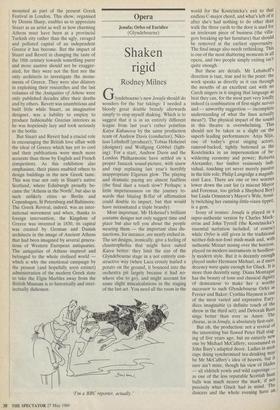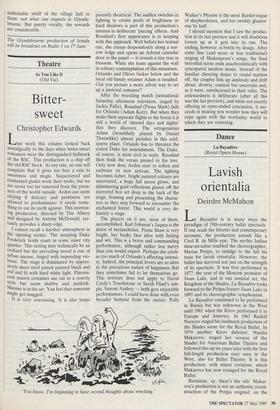Opera
Shaken rigid
Rodney Milnes
G
lyndebourne's new Jenufa should do wonders for the bar takings: I needed a bloody great double brandy aferwards simply to stop myself shaking. Which is to suggest that it is in an entirely different league from last year's rather pointless Katya Kabanova by the same production team of Andrew Davis (conductor), Niko- laus Lehnhoff (producer), Tobias Hoheisel (designer) and Wolfgang GObbel (light- ing). For a start, Andrew Davis and the London Philharmonic have settled on a proper Janacek sound-picture, with sinew and rasp replacing last year's horribly inappropriate Elgarian glow. The playing and dramatic pacing are almost faultless (the final duet a touch slow? Perhaps; a little impetuousness on the journey to- wards that blazing B-flat of affirmation could double its impact, but that would have necessitated a triple brandy).
Most important, Mr Hoheisel's brilliant costume designs not only suggest time and place but also tell you about the people wearing them — the important class dis- tinctions, for instance, are neatly etched in. The set designs, ironically, give a feeling of claustrophobia that might have suited Katya better: they limit the size of the Glyndebourne stage in a not entirely con- structive way (when Laca crossly hurled a potato on the ground, it bounced into the orchestra pit largely because it had no- where else to go), and might account for some slight miscalculations in the staging of the last act. You need all the room in the `I'm a BBC reporter, actually.' world for the Kostelnicka's exit to that endless C-major chord, and what's left of it after she's had nothing to do other than walk the three yards to the door is used for an irrelevant piece of business (the villa- gers breaking up her furniture) that should be removed at the earliest opportunity. The final image also needs rethinking. This is one of the most shattering moments in all opera, and two people simply exiting isn't quite enough. But these are details. Mr Lehnhoff's direction is taut, true and to the point: the work speaks as directly as it can through the mouths of an excellent cast with no Czech singers in it singing that language as best they can, for the most part very loudly indeed (a combination of first-night nerves and — unworthy suggestion — incomplete understanding of what the lines actually mean?). The physical impact of the sound in this theatre is overwhelming. This should not be taken as a slight on the superb leading performances: Anja Silja, one of today's great singing actors, ramrod-backed, tightly buttoned as the Kostelnicka in an impersonation of be- wildering economy and power; Roberta Alexander, her timbre resinously indi- vidual, touching yet never merely passive in the title role; Philip Langridge a magnifi- cent Laca. There are one or two worries lower down the cast list (a miscast Mayor and Foreman, too girlish a Shepherd Boy) but Linda Ormiston's Mayor's Wife, bossi- ly twitching her cunning-little-vixen tippet, is a gem.
Irony of ironies: Jenufa is played in a super-authentic version by Charles Mack- erras and John Tyrrell (the Kostelnicka's essential narration included, of course) while Orfeo is still given in the traditional neither-fish-nor-fowl mish-mash and, with authentic Mozart nosing over the horizon, played on modern instruments in heedless- ly modern style. But it is decently enough played under Hermann Michael, as if mere decency were quite enough for Gluck. It is more than decently sung. Diana Montague has the beauty of tone and classical dignity of demeanour to make her a worthy successor to such Glyndebourne Orfei as Ferrier and Baker; Cynthia Haymon is one of the most varied and expressive Eury- dices imaginable (a definite touch of the shrew in the third act); and Deborah Rees sings better than ever as Amor. The chorus, as in Jenufa, is absolutely first-rate. But oh, the production: not a revival of the interesting but flawed Peter Hall stag- ing of five years ago, but an entirely new one by Michael McCaffery, recostumed in John Bury's adapted decor. Ladies in mobs caps doing synchronised tea-drinking may be Mr McCaffery's idea of heaven, but it sure ain't mine, though his view of Hades — all eldritch yowls and wild caperings as one of the less reputable Scottish hunt balls was much nearer the mark, if not precisely what Gluck had in mind. The dancers and the whole evening have an undeniable whiff of the village hall to them: not what one expects at Glynde- bourne. But purely vocally, the rewards are considerable.
The Glyndebourne production of Jenufa will be broadcast on Radio 3 on 17 June.



















































 Previous page
Previous page